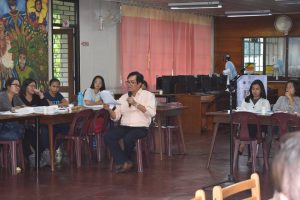The Philippines National Commission for UNESCO, in partnership with the University of the Philippines Baguio, Cordillera Studies Center and the Center for New Cinema (CNC) conducted a seminar entitled UNESCO Memory of the World, Documentary Awareness and Nomination Writeshop last July 22, 2016 at the College Library of the University of the Philippines-Baguio. The seminar focused on the Cordillera Documentary Heritage.
Baguio, Cordillera Studies Center and the Center for New Cinema (CNC) conducted a seminar entitled UNESCO Memory of the World, Documentary Awareness and Nomination Writeshop last July 22, 2016 at the College Library of the University of the Philippines-Baguio. The seminar focused on the Cordillera Documentary Heritage.
Present during the seminar-writeshop were archivists, curators, librarians, researchers, graduate students and teachers who are from the different schools located at Northern Luzon and CAR. The seminar focused on the discussion of the native life of the Cordillera, documents concerning the Cordillera, the early-days possessions inherent to the people of the Cordillera, the photographic evidences of the late 1800s of the city of Baguio and the pioneering schools of Baguio City.
The seminar was formally opened by Prof. Jessica K. Carino, Vice Chancellor for Administration of UP Baguio. Ms. Joanna Bagano, Program Officer of UNESCO PhilNatCom gave a message in behalf of Prof.Miralao . Baguio City secretary to the Mayor-Mr. Rafael Tallocoy gave a message in behalf of the Mayor.
Professor Delfin Tolentino served as the first plenary speaker of the seminar. He discussed about the importance of saving the documentary heritage. Prof. Tolentino mentioned that in the Cordillera per se, we do not have strong and sustained documentary society. The records should be objectified in writing. He emphasized that heritage is not just born but also achieved.
Prof. Nick Deocampo tackled about the seminar objectives. The seminar objectives are to conduct public awareness in preserving cultural, historical and social memory, to gain public recognition of the UNESCO Agency as in charge of the documentary heritage- the MOW program and to solicit nominations for documents that may be added to the MOW Registry of documents heritage.
The seminar talked about best practices, panel discussion on documentary preservation, teaching methods on how to use the documentary heritage to create cultural literacy for classroom learning. Video screenings of the native life in the Philippines that highlighted the natives from the Cordillera region was also done by Prof. Analyn Salvador- Amores, Associate Professor of Anthropology ,UP Baguio.
Varied historical documentations in the Cordillera were presented by Prof.Ma. Nela Florendo, Professor of History-UP Baguio and Mr. Isikias T. Picpican, Archivist, SLU Museum of Arts and Culture.
Early Baguio days in history, maps and schools were discussed by Prof. Charita Delos Reyes, PHD, Professor of History, UP Baguio, Erlyn Ruth Alcantara, Curator of Maryknoll Ecological Sanctuary and Ms. Cristina B. Villanueva, Library-in-Charge of Cordillera Special Collections.
“Ganito Kami Noon, Paano Kayo Ngayon?” (This was the way we were before, how are you now?) is a film that was shown in the seminar. The movie serves as a documentary heritage preserved in its medium as a historical memory of the Filipino people during the period of the Philippine Revolution. Prof. Nick Deocampo guided the audience with some video clips from the film and further discussed its association with our history and society.
Finally, Prof. Nick Deocampo discussed the details on the Memory of the World Register Nomination Form. An open forum was conducted for possible documentary nominations.
Prof. Leah Abayao , Director of Cordillera Studies UP-Baguio gave the closing remarks.
Ms. Leah C. Papay- Chief Librarian and Ms. Edenveza Vidal, Research Assistant represented the University of Baguio. Eden-UB RDC
